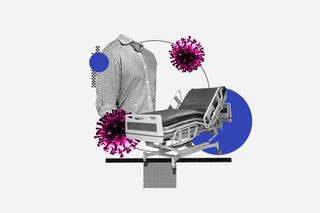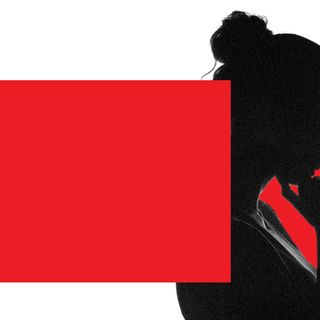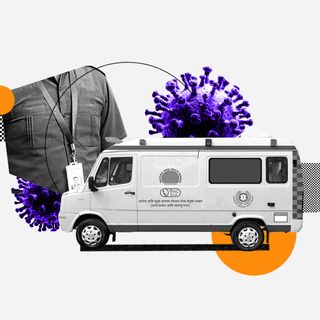
The Second Wave: A Hospital Admin Who Is Setting Up a New Covid Ward Says Staff “Morale Is A Challenging Thing Now”
We compiled portraits of frontline healthcare workers’ experiences in India’s current pandemic crisis. In this installment: A 38-year-old head of operations at a private hospital in Mumbai.

Dr. Saurabh Chordia, a 38-year-old head of operations at a private hospital in Mumbai, shares what his day looks like on the frontlines of the pandemic. This is the fourth installment of a series that looks at the toll of a worsening Covid19 crisis from multiple perspectives within the healthcare system.
Operations include when a patient comes from the time of admission till the time he exits — ensuring a smooth patient experience. We are currently getting both types of patients in this vicinity, Covid as well as non-Covid; we have almost 50-50. Compared to the last year, the outpatient services have now gone up. People know how to live with this disease. You cannot avoid the treatment of a non-Covid patient; it’s equally important. We have designed such a facility that there is no interaction between a Covid and a non-Covid patient.
Admission, discharge and payment are totally different for a Covid patient. We have kept online admission, where we understand what their requirement is — whether it’s a ward requirement or an ICU requirement. Based on that, their financial counseling is done online. And then they’re admitted. That whole process is online for Covid patients, to minimize the interaction with the staff and the non-Covid patients.
Last year was a very good learning story for us. Last year gave us learning, evolving knowledge so we are now faster in the decision making. The second surge has come now. The requirement of beds, everything, is more. So we are also focusing on how to increase bed capacity for Covid patients. But decisions are faster now, we can act fast and we can deliver fast.
When Covid came out, we needed to think broadly what are the requirements — separate entrances, separate lifts, people will have to be segregated on an all-Covid floor. That took time to brainstorm.
But now there is minimal risk of cross-infection. So, this year, we have been much more focused on the training part of the staff. Every day we have a session, whether it is housekeeping, whether it is security, whether it is nursing, whether it is a doctor — every level attends the training on the proper donning and doffing, and what are the infection control policies to avoid the Covid19. We are doing a lot of training now because we are setting up a new Covid floor.
The first thing is proper donning and doffing before and after entering Covid areas; if it is not proper, you are gone. We’re giving on regular basis training to new staff and refresher trainings. And fire trainings. All of the staff who are on the Covid areas, they are given fire trainings, so if any mishap happens, they can act fast. Our sprinkler system has backup. So, we are minimizing the chances of any mishap to happen on Covid floors.
Now it’s the second wave, we always have a backup plan. If you see current challenges, we have oxygen shortage everywhere. We are suffering from the Remdesevir pharmacy shortage. We have created our backups seeing what is the current requirement and what is the forecast. We have all those things in place, so that the patient should not suffer for any of these lacunas.
Currently we are setting up a new floor for the Covid patients, so we see all of the requirements and brainstorm. There’s a lot of demand for single rooms and twin-sharing. And we need to see that all the serves are in place in terms of the patient care — the doctors, the availability of the services, the housekeeping, the security, and customer care who can interact with them timely and take their feedback so all the patient care can be best. And what are the quality indicators we have to follow to give the best care to the patient and timely discharge? We are focused that patients should discharge timely so that other people can take that bed.
Patient feedback has drastically changed over the past year, that is for sure. People weren’t understanding Covid. Loss of taste, loss of smell is one of the key symptoms of the Covid19 — then people eat food, and they don’t like the food. So we have a dietician consultation with them, they make patients understand this is the thing, this is why you are not able to have it, and this is an official diet which is recommended by your physician. Then we review housekeeping schedules, the frequency it is scheduled, is it happening on time or not. Are consultation rounds being done or not. Are doctors interacting with patients’ families also, so that they are updated about the clinical condition of the patient. And we plan discharge so that people can come and pick up patients timely.
Morale is a challenging thing now. The health care workers are extremely stretching their time. Sometimes people are doing overtime also. We are training the people so that these things will not come out in low morale. We are arranging everything for staff, whatever is their requirement. We are pushing them for going for the vaccination. We are taking care of their basic needs, their accommodation — everything is given to them. We have a mentor and mentee system. We have a mentor who has been deployed into the Covid19 already. He or she will be guiding a whole team. It existed before Covid also, we just adapted it.
A pandemic always generates a lot of demand in the health care systems. Now currently, you see all facilities are running close to full. And people are aware social distancing, travel restrictions, shelter in their own places, could lower demand. But still, people are not following those measures. That is always demotivating. And that is the reason there is a second wave.
Last one year has been learning to live with the Covid19 protocols. But people have now started going to malls, to gyms, to all of these social places. People are using masks — but in an improper way. That is always demotivating because all health care workers are extending their duty hours. They’re not going to their homes many times. People have to understand social distancing, hand sanitizing/washing, masking is mandatory on a daily basis. And they have to avoid gathering in places.
This interview has been condensed and edited for clarity. As told to Liesl Goecker.
Related


At Least 1 in 10 Women Globally Have Miscarried a Pregnancy, Research Shows
